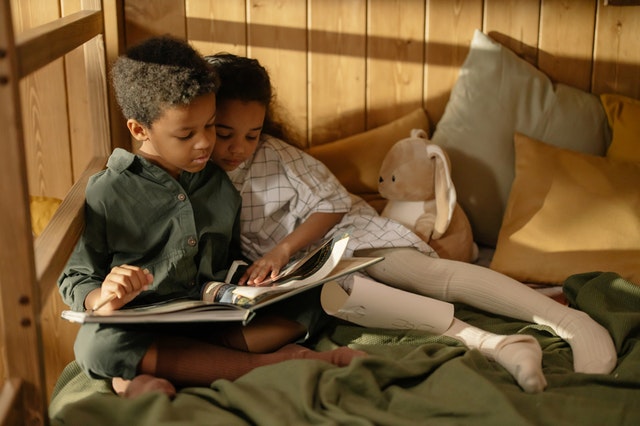By: María José Meneses, Originally published in Porch.com
As children, we were told that reading is important, and many of us are among the millions of library users, audible subscribers, and bookstore shoppers. But exactly why is it important, and how do we convince kids of its inherent value? Well, like most things, there’s a fiscal angle here. According to Pew Research Center, “adults whose annual household income is $30,000 or less are more likely than those living in households earning $75,000 or more a year to be non-book readers.” In other words, reading is associated with a higher income.
But, of course, it’s not only about the money. Reading is the gatekeeper of knowledge acquisition. Readers tend to be more empathetic humans because they view the world from multiple different perspectives thanks to the lens of fiction. Reading both fiction and non-fiction helps us become stronger communicators, better at speaking and writing. It’s only natural, therefore, to want to give our children an edge in life by encouraging them to read–to read well and read profusely. Here, we’ll examine the many different benefits of reading and how to encourage kids of any age to read more.
Most of us know that reading offers many benefits, but it’s helpful to spell them out, especially if we’re faced with reluctant readers. Who are reluctant readers? They’re the 27% of adults who haven’t read a book in the last year, a statistic that’s up, according to Pew, by 10% from a decade ago. Parents know that reading requires self-discipline and patience; the truth is, it doesn’t always provide the instant gratification that streaming movies and video games do. But, the better we understand the benefits of reading, the more disciplined we can be about supporting our children’s healthy reading habits and encouraging them to spend time with books.

Key Benefits of Reading:
Builds vocabulary: children who read are likely to encounter more new words than non-readers. Reading supports vocabulary acquisition and helps kids to become more effective at expressing themselves in speech and writing.
Supports communication and social skills: as kids read, they pick up on sentence structure and multiple ways of expressing thoughts. This helps them to become more skilled at communication. Better communicators tend to navigate their social environment more effectively than people who struggle to communicate.
Promotes independence and self-confidence: reading is a life skill. When children feel that they’ve mastered this skill, they grow in self-confidence and are certainly more independent because they know that they have the skills to find answers to their questions.
Enhances safety: can books make kids safer? When kids read books, they aren’t encountering content on YouTube or TikTok that is potentially harmful.
Supports imagination: reading words on a page allows kids to transport themselves to other places, other worlds, other mindsets with their imaginations running full steam ahead.
Entertains and engages the reader: if you haven’t stayed up past your bedtime because you’ve gotten lost in a great book, have you really lived your best life? We think not.
Improves grammar skills: Learning the mechanics of good writing isn’t fun. Somehow, when we learn these things through reading our favorite stories, it’s fun. We aren’t even aware that we’re learning these things!
Stimulates curiosity: reading inspires new interests because it confronts us with topics we weren’t familiar with before. That spark of curiosity can set up a path to life-long learning.
Tips to Encourage Reading

The earlier we begin to encourage reading, the better, but it’s never too late to nurture a love for books in your kids. Although you know your child best, you can rely on some tried-and-true techniques among other parents and educators for encouraging your kid to read. Here are some ideas to try out:
Create a reading niche: just because you can’t have Belle’s library (alas), you can still create a small library or cozy reading space in your home. It might be a reading tent in a corner of your child’s bedroom or a window seat beside a shelf of good books. Have your child help with its design so they’re invested in its success.
Set an example: parents are the most successful teachers–and kids learn our positive and negative behaviors. If they never see us reading, they’re unlikely to be convinced of reading’s fundamental importance to life–to real life, the life that adults are privy to. Model reading so they understand that you value it with actions, not just words.
Read to them when they’re young: children enjoy listening to stories, and that builds developmental skills too. Read to them and then discuss the stories. You’ll find that your chats will become treasured experiences you share together. Plus, when kids are interested in books when they’re young, they more likely to find them interesting as they age.
Keep reading materials in your home: “no kid who has parents who are interested in him and a houseful of books is poor.” –Sam Levinson. Enrich your kids’ lives by filling their bookshelves.
Support kids’ reading interests: fantasy or adventure stories might not be your cup of tea, but it’s more important for kids to enjoy what they’re reading when they’re young than to instruct them to read classics or more cumbersome texts before they’re ready. Support their interests by visiting libraries and bookstores together to find their favorite types of books.
Enjoy audiobooks: audiobooks are easy on the eyes, and they offer many of the same benefits as reading, but in listening form. Listen to audiobooks together when driving or doing household chores together.
Read each day: by making reading a part of the daily routine, you can help kids develop robust reading skills. Reading will become a positive habit for them, one they can carry into adulthood.
For more Parent Tips, Click Here
Click here to access free digital books and activities – BookSpring Weekly Themes

